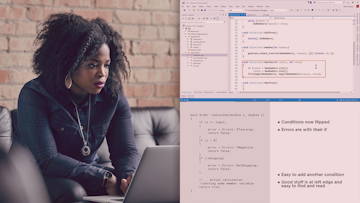
C++ has been a popular programming language for decades, which means there’s some really old code out there. Some of it is very hard to read and maintain. Capabilities have been added to the language and standard library that could simplify this code, and possibly make it faster or eliminate nagging intermittent bugs. In this course, Beautiful C++: Updating Legacy Code, you’ll learn how to approach a large and unfamiliar codebase and make changes to modernize code. First, you'll learn some strategies for deciding exactly what to change. Then, you'll be introduced to language features and library capabilities that may not have...
Read more
Good to know
Save this course
Activities
Career center
Software Engineer
Computer Programmer
Web Developer
Game Developer
Data Scientist
Software Architect
Mobile Developer
DevOps Engineer
Systems Analyst
Technical Writer
Database Administrator
Information Security Analyst
Network Administrator
Computer Support Specialist
Quality Assurance Analyst
Reading list
Share
Similar courses
OpenCourser helps millions of learners each year. People visit us to learn workspace skills, ace their exams, and nurture their curiosity.
Our extensive catalog contains over 50,000 courses and twice as many books. Browse by search, by topic, or even by career interests. We'll match you to the right resources quickly.
Find this site helpful? Tell a friend about us.
We're supported by our community of learners. When you purchase or subscribe to courses and programs or purchase books, we may earn a commission from our partners.
Your purchases help us maintain our catalog and keep our servers humming without ads.
Thank you for supporting OpenCourser.


